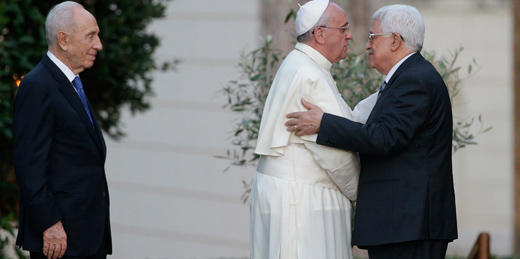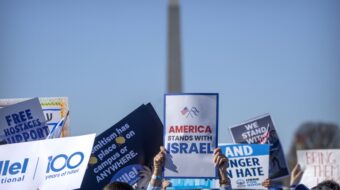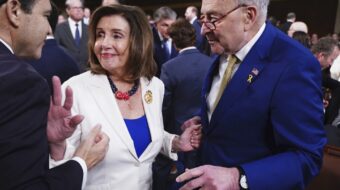
VATICAN CITY – The Vatican officially recognized the state of Palestine in a new treaty finalized Wednesday. The treaty, which deals with the activities of the Catholic Church in Palestinian territory, makes clear that the Holy See has advanced its diplomatic recognition from the Palestine Liberation Organization to the state of Palestine itself.
While the Vatican’s action is basically symbolic, a New York Times report calls it “significant,” saying it “lends a powerful signal of moral authority and legitimacy to the efforts by the Palestinian Authority’s president, Mahmoud Abbas, to achieve statehood despite the long paralyzed Israeli-Palestinian peace process.”
The Vatican previously welcomed the decision by the United Nations General Assembly in 2012 to recognize a Palestinian state. But the new treaty is the first legal document negotiated between the Holy See and the Palestinian state and constitutes official diplomatic recognition.
“Yes, it’s a recognition that the state exists,” said the Vatican spokesman, the Rev. Federico Lombardi.
The treaty was finalized days before President Abbas visits Pope Francis at the Vatican. Abbas is heading to Rome to attend Francis’ canonization Sunday of two new saints from the Holy Land.
“This is a very important recognition as the Vatican has a very important political status that stems from its spiritual status,” said Abbas’ senior aide, Nabil Shaath. “We expect more EU countries to follow.”
Hanna Amireh, head of the Palestinian Presidential Committee on Church Affairs, told the Times that the treaty broadly covered the Vatican’s interests in the West Bank, East Jerusalem and the Gaza Strip, including the status of churches and church courts and taxes on church charities, institutions and lands, and other cultural and diplomatic matters. He said the treaty had been under negotiation for about a year.
“The Vatican is the spiritual capital of the Catholics, and they are recognizing Palestine, that’s the chief importance,” said Amireh, who is also a leader of the Palestinian People’s Party and a member of the Palestine Liberation Organization’s executive committee. He added that the move counters an image of Palestinians as militants or terrorists, calling it a “recognition of the Palestinian character that has a clear message for coexistence and peace.”
The Vatican has been referring unofficially to the state of Palestine for at least a year.
During Pope Francis’ 2014 visit to the Holy Land, the Vatican’s official program referred to Abbas as the president of the “state of Palestine.”
The Vatican’s foreign minister, Monsignor Antoine Camilleri, acknowledged the change in status, but said the shift was simply in line with the Holy See’s position.
The Holy See clearly tried to underplay the development, suggesting that its 2012 press statement welcoming the UN vote constituted official recognition. But nowhere in that statement does the Vatican specifically say it recognizes the state of Palestine, and the Holy See couldn’t vote for the UN resolution because it doesn’t have voting rights at the General Assembly.
The 2012 UN vote recognized Palestine as a non-member observer state, made up of the West Bank, Gaza Strip and East Jerusalem, lands Israel captured in the 1967 “Six-Day War.”
The Palestinians celebrated the vote as a milestone in their quest for international recognition. Most countries in Africa, Asia and South America have individually recognized Palestine. In Western Europe, Sweden took the step last year, while several parliaments have approved non-binding motions urging recognition.
The new Vatican announcement immediately sparked Israeli government ire. The Israeli foreign ministry claimed in a text message, “This move does not promote the peace process and distances the Palestinian leadership from returning to direct and bilateral negotiation.” The United States and Israel have opposed recognition, arguing that it would undermine efforts to negotiate an Israeli-Palestinian deal on the terms of Palestinian statehood. But, while most countries in Western Europe have held off on recognition, some have hinted that their position could change if peace efforts remain deadlocked.
This isn’t the first time that the Vatican under Francis has taken diplomatic moves knowing that it would please some quarters and ruffle feathers elsewhere: Just last month, he referred to the slaughter of Armenians by Turkish Ottomans a century ago as a “genocide,” prompting Turkey to recall its ambassador.
The Pope this week also warned “the powerful of the Earth” that “God will call them to judgment” if they fail to protect the environment so that everyone has enough to eat.
“The planet has enough food for all, but it seems that there is a lack of willingness to share it with everyone,” Francis said Tuesday at a mass in Rome to mark the opening of the general assembly of Caritas Internationalis, a federation of Catholic charitable groups.
“We must do what we can so that everyone has something to eat, but we must also remind the powerful of the Earth that God will call them to judgment one day and there it will be revealed if they really tried to provide food for Him in every person and if they did what they could to preserve the environment so that it could produce this food.”
Francis is expected to issue an encyclical letter on the environment this year.
His top adviser, Cardinal Oscar Rodríguez Maradiaga, blasted climate-change skeptic “movements in the United States,” blaming capitalist ideology for their opposition to environmental protection.
“The ideology surrounding environmental issues is too tied to a capitalism that doesn’t want to stop ruining the environment because they don’t want to give up their profits,” Rodríguez told a news conference in Rome at the start of the Caritas meeting.
Associated Press writers Nicole Winfield in Vatican City, Ian Deitch in Jerusalem and Mohammed Daraghmeh in Ramallah, West Bank, contributed to this story.
Photo: In this June 8, 2014, photo Pope Francis and Palestinian President Mahmoud Abbas embrace each other as Israel’s President Shimon Peres, left, watches during an evening of peace prayers in the Vatican gardens. Gregorio Borgia/AP

MOST POPULAR TODAY


Zionist organizations leading campaign to stop ceasefire resolutions in D.C. area

High Court essentially bans demonstrations, freedom of assembly in Deep South

Afghanistan’s socialist years: The promising future killed off by U.S. imperialism

Communist Karol Cariola elected president of Chile’s legislature






Comments